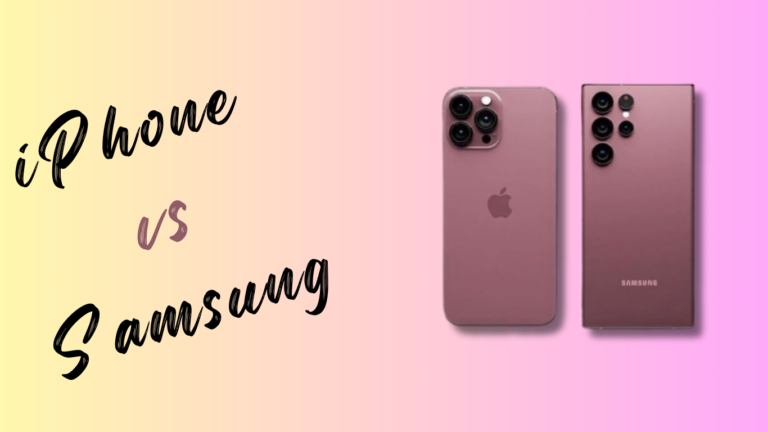Confused between iPhone vs Samsung? Choosing the right smartphone in 2025 is tough. Both brands offer top-tier performance, unique ecosystems, and cutting-edge features. Let’s break down the key differences to help you decide!
iPhone vs. Samsung: A Detailed 2025 Comparison of Features, Performance & Price
Apple and Samsung have consistently pushed the boundaries of smartphone technology, setting new industry standards each year. In 2025, both brands have introduced powerful devices with cutting-edge features, making the competition tougher than ever. Here’s a detailed comparison to see how they stack up against each other.
Build Quality: Tie
iPhone vs Samsung shows no clear winner in build quality. Apple uses aerospace-grade aluminum and Ceramic Shield glass for durability. Samsung integrates Armor Aluminum and Gorilla Glass Victus for impact resistance.
Both brands offer IP68 water and dust resistance, ensuring protection in harsh conditions. Apple focuses on precision engineering, while Samsung emphasizes durability and design innovation. The materials, frame rigidity, and glass protection make their flagship devices equally robust.
Affordability: Samsung
iPhone vs Samsung shows Samsung leading in affordability. Samsung offers budget, mid-range, and flagship models, while Apple focuses on premium pricing.
Samsung’s Galaxy A14 ($200) and A54 ($450) provide budget options. The Galaxy S24 ($800) and S24 Ultra ($1,300) cater to high-end users. Apple’s iPhone 15 ($800) and iPhone 15 Pro Max ($1,200) remain premium. Samsung ensures more choices at lower price points.
Ecosystem: iPhone
Apple leads in ecosystem integration. iOS, macOS, watchOS, and iPadOS offer seamless connectivity. Features like AirDrop, Handoff, and Universal Clipboard enable effortless transitions.
Samsung’s ecosystem connects Galaxy devices, Windows PCs, and SmartThings but lacks deep integration. iCloud, iMessage, and FaceTime provide unmatched synchronization. Apple ensures better hardware-software optimization, making it the clear winner.
Customization: Samsung
Samsung offers extensive customization options. One UI allows users to modify themes, icons, and layouts. Good Lock, Edge Panels, and Always-On Display enhance personalization.
Apple limits customization within iOS. Users can change wallpapers and app icons but lack deep UI modifications. Samsung’s flexible interface and third-party support make it the winner in customization.
Camera Quality: Samsung
Samsung leads in camera technology with higher megapixels and advanced AI processing. The Galaxy S24 Ultra features a 200MP main sensor, 10x optical zoom, and Nightography mode for low-light clarity.
Apple focuses on color accuracy and computational photography. The iPhone 15 Pro Max offers a 48MP sensor with 5x optical zoom. However, Samsung’s superior zoom, detail, and versatility make it the winner in camera quality.
Battery and Performance: Tie
Apple’s iPhone 15 Pro Max features the A17 Pro chip, delivering efficiency and speed. Samsung’s Galaxy S24 Ultra runs on the Snapdragon 8 Gen 3, optimized for multitasking and gaming.
Battery life varies by usage. iPhones provide consistent optimization with iOS efficiency, while Samsung offers larger battery capacity and faster charging. Both brands deliver top-tier performance, making this category a tie.
What’s In the Box: Tie
Apple’s iPhone 15 Pro Max and Samsung’s Galaxy S24 Ultra include a USB-C cable but exclude a charging adapter. Both brands removed chargers for sustainability reasons and to reduce e-waste.
Packaging for both devices is compact and eco-friendly, containing essential documentation and a SIM ejector tool. Buyers must purchase chargers separately, making this category a tie.
iPhone vs Samsung: Who’s the Winner?
iPhone excels in ecosystem integration, software updates, and long-term value. iOS offers optimized performance, privacy, and security. Apple’s ecosystem ensures seamless device connectivity.
Samsung leads in customization, hardware innovation, and camera versatility. One UI allows extensive personalization, while flagship models feature advanced zoom and high-resolution sensors.
Battery life and in-box accessories remain tied, with both brands reducing extras for sustainability. Performance is comparable, with Apple’s A-series chips excelling in efficiency and Samsung’s Exynos or Snapdragon offering raw power.
Overall, iPhone wins for longevity, software experience, and ecosystem efficiency. Samsung excels in hardware variety, customization, and affordability. The choice depends on user priorities.
Frequently Asked Questions (FAQs)
Which has better battery life, iPhone or Samsung?
Battery performance varies by model. Both brands offer devices with excellent battery life. It’s essential to compare specific models for accurate information.
Are iPhone apps better than Android apps?
Both platforms offer a vast selection of apps. Some users find iOS apps to be more polished and optimized. However, app quality can vary, and many apps are available on both platforms.
Can I transfer my data from an iPhone to a Samsung device or vice versa?
Yes, data transfer between iOS and Android devices is possible. Both Apple and Samsung provide tools to facilitate this process, though the complexity can vary.
Which is more secure, iPhone or Samsung?
Both Apple and Samsung prioritize security. iOS is generally considered to have a stronger security reputation due to its closed ecosystem. However, Samsung has made significant strides in enhancing device security.
Do Samsung devices offer more customization options than iPhones?
Yes, Samsung devices, running on Android, offer extensive customization options, allowing users to tailor their experience. In contrast, iPhones have a more uniform interface with limited customization.
How do iPhone and Samsung cameras compare?
Samsung phones often have better cameras for the price, offering advanced features and higher megapixels. iPhones are known for consistent image quality and color accuracy. The best choice depends on individual preferences.
Which brand offers better software support and updates?
Apple provides regular and timely software updates across all its devices, ensuring longevity. Samsung has improved its update policy but may not match Apple’s consistency.

